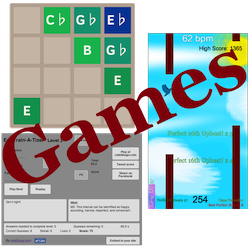I’ve learned to never force music into the box I originally intended it to be put into, but this violin and clarinet duet took that concept to a new level for me. My original plan was to write a sacred work for violin and saxophone for my friend and I to play during communion services. Typically, communion has two musical segments; one for each communion element. So, I wanted the work to be two movements with each being less than two minutes long. The first movement came together very naturally and very quickly, but then life happened and I never got around to writing the second movement. When I finally got a chance to work on it again, I realized that there was no good musical reason to add a second movement. I also realized that the only reason I was using the saxophone was because I sound my best on it. Clarinet blends with violin much more naturally (although I attribute this partly to traditional bias) and the very simple part I had written for it makes more sense with a simpler sound. I rewrote the piece for violin and clarinet thinking I would just have my wife play it instead (although I ended up recording it since we weren’t married yet and she was 650 miles away at the time). So I started with a two movement work for violin and saxophone to be used for communion and ended up with a one movement work for violin and clarinet to be used for who knows what.
Download score (pdf) – $2.99
Download whole recording (mp3) – $0.59
Download both (pdf/mp3) – $3.49
Foreign Currency? Click Here.
The recording process was another matter. I had most of the Purpose project squared away with only this piece left to record. I got off my night shift at 6:00am on Sunday morning and set to work on laying down the clarinet track so that Eva could come and add her part that afternoon. I armed the four microphones I was using and combined several takes to form a satisfactory performance. Before I remembered that I hadn’t saved my progress, the power went out and I was forced to try again and ended up with a significantly better sound (and I still made it to church on time). That afternoon I got all the takes I needed from Eva and finally went to bed (I’d been up since Saturday afternoon). On Monday I woke up only to discover that all of the files for the violin’s tracks had been scattered beyond repair. I was only able to salvage the files from one microphone resulting in a very thin sound. But just for kicks, I tried muting 3 of the four clarinet recordings so that they would both sound thin and be able to blend. To my surprise I liked the result very much. It certainly wasn’t the pristine audio quality I wanted for the Purpose project, but there was an irresistible authenticity in the sound that spoke with an innocence and a sincerity that I could not have possibly come up with intentionally. Instead of redoing the recording, I decided to sit on the idea of using what I had. When I tried listening to the CD in its entirety to see whether or not the transitions worked, I finally decided that this authentic and unrefined sound perfectly captured the reason I made the CD.
From the very first note, everything about this CD is polished and seemingly flawless in the aspects of performance, composition and engineering. Except for a few minor details, I could not have made this project any better even if more resources had been available to me. The first six tracks work together to communicate to the listener that life has value, meaning, and purpose and it is a wonderful gift from God that is worth your time to seek and understand. But what does all this look like? Where does it lead? It leads us to the feet of Jesus with nothing to offer but our love and authentic awe and worship. How would I depict this musically? I pick up an instrument I can’t play well enough to impress anyone with and play Amazing Grace with a sister in Christ Jesus. No virtuosic technique. No polished well-mastered recording. Not even a terribly original composition. Just two people showing authentic and sincere adoration for their creator through sound. A simple “I love you” to the creator of the universe. The very essence of the purpose of life.


